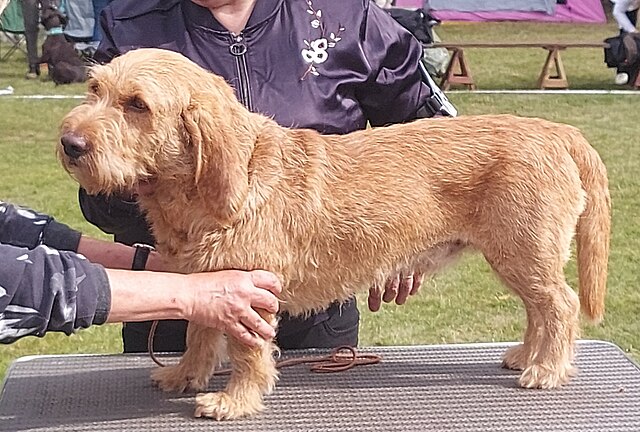


The Basset Fauve de Bretagne is a small but robust scent hound, originally bred in France for hunting purposes. This breed is known for its keen sense of smell, stamina, and friendly nature. Despite being a working dog, it has adapted well to family life, making it a great companion for active families. With a distinctive, scruffy coat and long ears, the Basset Fauve de Bretagne is both charming and agile, excelling in various dog sports and activities.
The Basset Fauve de Bretagne is an ancient breed that dates back to at least the 16th century. Its name "Basset" refers to its short legs, while "Fauve" means fawn, referring to the breed's typical color. The breed originated in the Brittany region of France, where it was developed to hunt small game such as rabbits and hares. The Basset Fauve de Bretagne is believed to be a descendant of the Grand Fauve de Bretagne, a larger hunting dog that was eventually bred down to its smaller size for easier maneuverability in the dense brush. After facing near extinction in the early 20th century, the breed was revived thanks to dedicated breeders. Today, it is recognized as a distinct breed in many countries, including the United States and France.
The Basset Fauve de Bretagne is a small, muscular dog with a distinctive long, scruffy coat that comes in a fawn or reddish-brown color. This breed typically stands between 12 to 15 inches (30 to 38 cm) tall at the shoulder and weighs between 25 to 40 pounds (11 to 18 kg). Its ears are long and droopy, and its eyes are expressive and dark. The Basset Fauve de Bretagne's body is compact with a deep chest and a tail that is often carried high. The coat is rough, dense, and wiry, requiring regular grooming to prevent matting. The breed's strong sense of smell is one of its most notable characteristics, which helps it in hunting tasks.
The Basset Fauve de Bretagne is known for its friendly, affectionate, and playful nature. It is an intelligent breed that is typically good-natured with both children and other pets, making it a great choice for families. While it has a strong hunting instinct, it is generally not aggressive and enjoys spending time with its human companions. The breed is known for being independent and sometimes stubborn, so it may require a firm and patient owner who can provide proper guidance. Despite its hunting background, it can be quite adaptable to a variety of living environments, from rural homes to city apartments, as long as it receives enough exercise and mental stimulation.
The Basset Fauve de Bretagne is an energetic and active breed that requires regular exercise to stay healthy and happy. Though small in size, this breed has a lot of stamina and enjoys long walks, runs, and play sessions. It is especially fond of sniffing and tracking, so engaging it in scent-based activities, such as nose work or tracking, is a great way to keep it mentally and physically stimulated. While it is adaptable to various living situations, the breed will thrive in homes where it can have access to a secure, enclosed yard for daily exercise. A lack of exercise can lead to boredom, which might manifest as undesirable behaviors.
While the Basset Fauve de Bretagne is intelligent and capable of learning quickly, it can also be a bit independent and stubborn. This means that training should be consistent, patient, and positive. Early socialization is important to help the breed interact well with other dogs, pets, and people. The breed is generally good with children, but socialization helps ensure that it is comfortable and well-behaved in different environments. Reward-based training methods work best with this breed, as it is motivated by praise and treats. While it can be somewhat independent, the Basset Fauve de Bretagne enjoys learning and being part of family activities.
The Basset Fauve de Bretagne is a generally healthy breed, but like all dogs, it can be prone to certain health issues. Some of the common concerns include hip dysplasia, ear infections (due to its long ears), and eye conditions. Regular vet check-ups, a balanced diet, and proper exercise can help prevent many health issues. This breed's wiry coat requires regular grooming to prevent matting and to keep the coat in good condition. It is also important to check its ears regularly to prevent infections and keep them clean and dry. The Basset Fauve de Bretagne is known for being an adaptable breed, but it does require attention to its health needs to ensure a long and happy life.
The Basset Fauve de Bretagne has an average lifespan of 12 to 14 years. With proper care, a balanced diet, regular exercise, and routine veterinary visits, this breed can live a long and healthy life. It's important to be aware of potential health conditions as the dog ages and to provide it with the necessary support and care to ensure a good quality of life in its senior years.
© copyright Dog Compendium 2024 - 2026